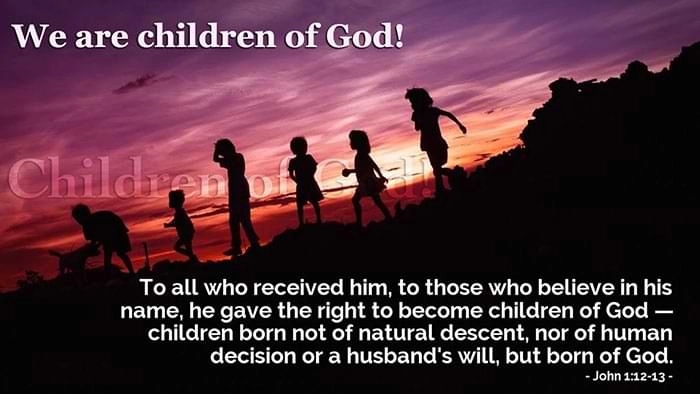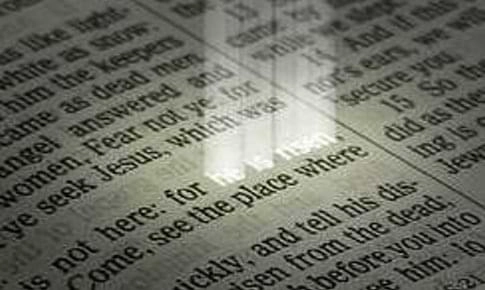
If Every Human Is A Child Of God,
Then Is God A Father Of Evil? God Forbid.
Many say that all men and women are the children of God and that God is the Father of all, but this belief comes from a holding of vain traditions of men. The Scriptures tell us plainly otherwise;
John 1:12 But as many as received him, to them gave he power to become the sons of God, even to them that believe on his name:
John 1:13 Which were born, not of blood, nor of the will of the flesh, nor of the will of man, but of God.
Romans 9:8 That is, They which are the children of the flesh, these are not the children of God: but the children of the promise are counted for the seed.
But some will argue with Scripture using Scripture to make their case and will commonly quote;
Gen 1:26 And God said, Let us make man in our image, after our likeness: and let them have dominion over the fish of the sea, and over the fowl of the air, and over the cattle, and over all the earth, and over every creeping thing that creepeth upon the earth.
Gen 1:27 So God created man in his own image, in the image of God created he him; male and female created he them.
To consider since man is made in the image of God means all men are children of God; let us learn more about the first man Adam. Commentators and lexicographers, with a few exceptions since the days of Josephus, explain the word 'Adam' as being derived from the Hebrew Adamah, 'the ground' (Gen. 2:7). In the first place we must remember that while the name Adam does not occur in the English Bible until Genesis 2:19, the Hebrew word has already occurred nine times, namely in Genesis 1:26-27; Gen. 2:5, Gen. 2:7-8, Gen. 2:15-16, Gen. 2:18 where it is translated 'man' or 'the man.' The beasts were also formed out of the 'ground' of the adamah (Gen. 1:25; Gen. 2:19), yet no beasts appear to have been given a name that associated them with their earthy origin. When we consider the first occurrence of the Hebrew word 'Adam,' namely, in Genesis 1:26, we have the following context:
'And God said, Let us make man in our IMAGE, after our LIKENESS ... so God created man in His own image' (Gen. 1:26-27).
It seems strange to name the first man after the 'ground' before the record even alludes to the adamah from which he was taken. Parkhurst in his Hebrew Lexicon, refers to the word 'Adam' to the Hebrew damah, which primarily means 'to be equal' (Isa. 46:5) and then in the feminine form damuth 'likeness' (Isa. 40:18). In the book of the generations of Adam, it is this aspect of his creation, not that of Genesis 2:6-7 that is perpetuated.
'In the day that God created man, in the likeness of God made He him' (Gen. 5:1).
The purpose for which man was created is expressed in the three terms 'image,' 'likeness,' and 'dominion.' The word 'image' tselem is from the Hebrew root tsel, meaning 'shadow.'
The first occurrence in the Old Testament is in Genesis 19:8, 'the shadow of my roof.' The LXX translates tsel by the Greek skia some twenty-seven times. The latter is found in the New Testament seven times as follows:
'The shadow of death' (Matt. 4:16; Luke 1:79).
'The shadow of it' (a tree). (Mark 4:32).
'The shadow of Peter' (Acts 5:15).
The word is also used figuratively of the ceremonial law: 'a shadow of things to come, and not the very image' (Heb. 10:1; Col. 2:17); and in Hebrews 8:5, 'the example and shadow of heavenly things.' Adam was not the 'very image,' but he in great measure shadowed forth the Lord, and Romans 5:12-14 indicates that in other ways than those suggested in Genesis 1:26-27 Adam was a 'figure of Him that was to come.' By creation, man is 'the image and glory of God' (1 Cor. 11:7); but this image is, after all, 'earthy':
'The first man is of the earth, earthy: the second man is the Lord from heaven ... as we have borne the image of the earthy, we shall also bear the image of the heavenly' (1 Cor. 15:47-49).
Because of the earthy nature of man and the fact that he is a shadow of God, not substance, we see readily why Scripture calls angels sons of God in Gen. 6:2 and the sons of Adam, the daughters of men. See teaching Sons Of God.
In his second epistle to the Corinthians, the apostle resumes the theme, and we give below the two references to 'the image' in this second letter:
'But we all, with open face beholding as in a glass the glory of the Lord, are changed into the same image from glory to glory, even as by the Spirit of the Lord' (2 Cor. 3:18).
'In whom the god of this world hath blinded the minds of them which believe not, lest the light of the glorious gospel of Christ, Who is the image of God, should shine unto them' (2 Cor. 4:4).
How many know and preach this Gospel? How many realize that the announcement that 'Christ is the image of God' is the 'Gospel of the Glory of Christ.' and the subject of Satan's attacks from the beginning? Before the world was, the Lord Jesus Christ had this 'Glory' (John 17:5), and it was the subject of Satanic opposition, as we learn from Ezekiel 28. It was 'shadowed forth' in the creation of man and attacked by the Serpent in the garden of Eden (Gen. 3). It was 'veiled' by the god of this age, as explained in 2 Corinthians 3 and 4, and is the goal towards which the purpose of the ages is directed. The central section of Romans (5:12 to 8:39) opens with Adam, a failing figure of Him that was to come, and closes with the goal of God's great purpose: 'for whom He did foreknow, He also did predestinate to be conformed to the image of His Son' (Rom. 8:29).
The climax of revelation in connection with 'the Image' is found in Colossians:
'His dear Son ... Who is the Image of the Invisible God' (Col. 1:13-15).
When Christ, Who is our life, shall appear, then shall ye also appear with Him in glory ... and have put on the new man, which is renewed in knowledge after the Image of Him that created him (Col. 3:4, Col. 3:10).
Here, both in Colossians 1 and 3, the 'image' is connected with creation. Moreover, Colossians 1:16 makes it clear that the Son was the Creator in Genesis 1:26 and that Adam foreshadowed in some way yet to be considered, 'Him that was to come,' 'the last Adam.'
Returning to Genesis 1:26, we must now consider the added clause 'after our likeness' (demuth). The LXX Version translates this by kath homoiosin, which we may compare with the apostle's use of the word when speaking to the Athenians in Acts 17:29. Once a man believes in Christ, the following is true.
‘Forasmuch then as we are the offspring of God, we ought not to think that the Godhead is like (homoios) unto gold, or silver, or stone, graven by art and man's device' (Acts 17:29).
Isaiah also challenges us with the question:
'To whom then will ye liken (damah, see demuth above) God?' (Isa. 40:18).
And Ethan says:
'Who in the heaven can be compared unto the LORD? Who among the sons of the mighty can be likened (damah) unto the LORD?' (Psa. 89:6).
Nevertheless, it is true that man was made after the likeness of God, and in James 3, we read, concerning the tongue:
'Therewith bless we God, even the Father; and therewith curse we men, which are made after the similitude (homoiosis) of God' (James 3:9).
The prophet Hosea uses the word damah when speaking of the way in which God had condescended to use figures of speech:
'I have multiplied visions, and used similitudes, by the ministry of the prophets' (Hos. 12:10).
During His public ministry, the Lord Himself used many similitudes, for example:
'The kingdom of heaven is like (homoios) unto treasure' (Matt. 13:44).
'Unto what is the kingdom of God like?' (Luke 13:18).
'Whereunto shall I liken this generation?' (Matt. 11:16).
Adam was to God what a figure of speech is to thought, a symbol, an analogy, a type. When Nebuchadnezzar saw in a dream the successive kingdoms of Gentile rule in the form of an image, neither he nor Daniel ever imagined that such kingdoms were actually 'like' the image itself, but simply that this image and its peculiar construction 'shadowed forth' in symbol the moral characteristics of the kingdoms concerned. So, in Genesis 1:26, there is no question of external resemblance. Whether seen in the frail type of Adam or in the glorious person of the Son of God, the 'image and likeness' are never to be understood as physical.
How far, and in what direction, was Adam intended to shadow forth God Himself? How far was he, as a creature, able to represent Deity? What limits can be set? The reader will no doubt be acquainted with the two extreme answers to these questions. There are some who will not allow the image and likeness to be anything more than physical, while there are others who would deduce from this passage the inherent immortality of the soul. The truth lies mid-way between the two extremes.
'And God said, LET US make man in OUR image, after OUR likeness; and LET THEM have dominion' (Gen. 1:26).
The name 'Adam' is similar to the Hebrew word for 'likeness,' This 'likeness' was expressed in the 'dominion' which was originally conferred upon man. When sin entered into the world, however, resulting in a curse upon the earth, his dominion over the lower creatures was impaired. When Noah, whom we can regard as a sort of second Adam, steps out of the ark into a new world, the word 'dominion' is no longer used, and 'the fear of you and the dread of you' takes its place (Gen. 9:2). Man, however, is still looked upon as being 'in the image of God' (Gen. 9:6), and 'in the likeness of God' (Jas. 3:9). The dominion that was given to Adam was:
'over the fish of the sea, and over the fowl of the air, and over the cattle, and over all the earth, and over every creeping thing that creepeth upon the earth' (Gen. 1:26).
This dominion was a 'shadow' of the greater dominion that was to be exercised by Christ, the true image of God. David, in Psalm 8, sees something of this, and the apostle Paul in the New Testament completes the story:
‘When I consider Thy heavens, the work of Thy fingers, the moon and the stars, which Thou hast ordained; what is man, that Thou art mindful of him? and the son of man, that Thou visitest him? For Thou hast made him a little lower than the angels, and hast crowned him with glory and honour. Thou madest him to have dominion over the works of Thy hands; Thou hast put all things under his feet: all sheep and oxen, yea, and the beasts of the field; the fowl of the air, and the fish of the sea, and whatsoever passeth through the paths of the seas’ (Psalm 8:3-8).
If we turn to the Epistle to the Hebrews, we shall see that Adam foreshadowed Christ. The Creator of Genesis 1:26 is addressed in Psalm 8, and the Psalmist says that 'the heavens are the work of Thy fingers.' Unless we are willing to quibble over the difference between 'fingers' and 'hands,' it is clear that Christ is the Creator in Whose image and likeness Adam was created, for in Hebrews we read:
'And, Thou, Lord, in the beginning hast laid the foundation of the earth; and the heavens are the works of Thine hands' (Heb. 1:10).
From Hebrews 1, we proceed to Hebrews 2, where we have Psalm 8 quoted, with the comment:
'For in that He put all in subjection under him, He left nothing that is not put under him' (Heb. 2:8).
This shows that we have passed from the type, whose dominion was over sheep and oxen, to the antitype, whose dominion is overall. The apostle continues:
'But now we see not yet all things put under him. But we see Jesus, Who was made a little lower than the angels for the suffering of death, crowned with glory and honour; that He by the grace of God should taste death for every man' (Heb. 2:8-9).
This dominion of which Adam's 'likeness' was but a faint shadow is further expanded in Ephesians 1, where we reach the zenith of the revelation of 'the mystery of Christ.' In this Epistle, we are concerned with that section of the 'all things' that is associated with the exalted sphere where Christ sitteth 'far above all heavens' (Eph. 4:10). And so we read:
'He raised Him from the dead, and set Him at His own right hand in the heavenly places, far above all principality, and power, and might, and dominion, and every name that is named, not only in this world (age), but also in that which is to come: and hath put all things under His feet, and gave Him to be Head over all things to the church, which is His body, the fulness of Him that filleth all in all' (Eph. 1:20-23).
With this rapid glance at the relationship between this 'dominion' and 'Mystery,' let us turn back now to 1 Corinthians 15 to see one further application of the passage:
'Then cometh the end, when He shall have delivered up the kingdom to God, even the Father; when He shall have put down all rule and all authority and power. For He must reign, till He hath put all enemies under His feet. The last enemy that shall be destroyed is death. For He hath put all things under His feet. But when He saith all things are put under Him, it is manifest that He is excepted, which did put all things under Him. And when all things shall be subdued unto Him, then shall the Son also Himself be subject unto Him that put all things under Him, that God may be all in all' (1 Cor. 15:24-28).
This goal of the ages is the fulfillment of the pledge shadowed forth in the creation of Adam.
We must now return to Genesis 1:26 in order to investigate what is actually implied by the word 'dominion.' There are various possible alternatives that are not used in this passage. The word used here is not baal, 'to have dominion as lord and proprietor' (Isa. 26:13), nor mashal, 'to reign as a governor or a superior' (Judges 14:4), nor shalat, 'to rule' (Psa. 119:133), but radah, 'to tread down, to subdue.' The following are three passages in which this particular word occurs:
'They that hate you shall reign over you' (Lev. 26:17).
'With force and with cruelty have ye ruled' (Ezek. 34:4).
'Rule thou in the midst of thine enemies' (Psa. 110:2).
These references indicate something of the nature of this particular type of dominion, particularly the passage from Psalm 110, which is Messianic and speaks of the Day of the Lord. The Psalm goes on to speak of the Lord 'striking through kings,' 'filling places with dead bodies,' and 'wounding the heads over many countries' (Psa. 110:5-6). This conception of dominion is carried over into Genesis 1:28, where we read:
'Replenish the earth, and subdue it,'
The word 'subdue' is a translation of the Hebrew cabash, and its significance may be gathered from the fact that its substantival form means a 'footstool' (2 Chron. 9:18). In Nehemiah 5:5, it is rendered 'to bring into bondage'; and it is the word used by the King when he exclaims of Haman, 'Will he force the Queen?' (Est. 7:8). The word is also used for the conquest of Canaan under Joshua (Josh. 18:1), a subjugation whose rigor there is no need to quote chapter and verse to prove.
The LXX translates the word ‘subdue’ by kata kurieuo, meaning 'to rule imperiously,' 'to lord it over,' and 'to get the mastery.' Its occurrences in the New Testament will give further light on its meaning:
'Ye know that the princes of the Gentiles exercise dominion over them' (Matt. 20:25, see also Mark 10:42).
'The man in whom the evil spirit was leaped on them, and overcame them, and prevailed against them' (Acts 19:16).
'Neither as being lords over God's heritage' (1 Pet. 5:3).
The creation of Adam, his very name, and the dominion given to him all foreshadowed the subduing of all enemies beneath the feet of the Lord Jesus Christ. An enemy is most certainly in view in Genesis 1:26-28, and in Chapter 3, he is revealed - 'that old serpent, called the Devil and Satan' (Rev. 12:9).
Men talk about redemption from sins; What they need is redemption from the claims of death and the grave (hell). This redemption is available, and thus, man can become a son of God, but only on the terms of faith. Faith cometh by hearing, and hearing by the Word of God. Man has invented other ways, but they are useless.
The one who redeems must be a kinsman. Christ is the Kinsman Redeemer set forth in the types of the OT. To be a child of God, one must receive Christ (John 1:12).




























